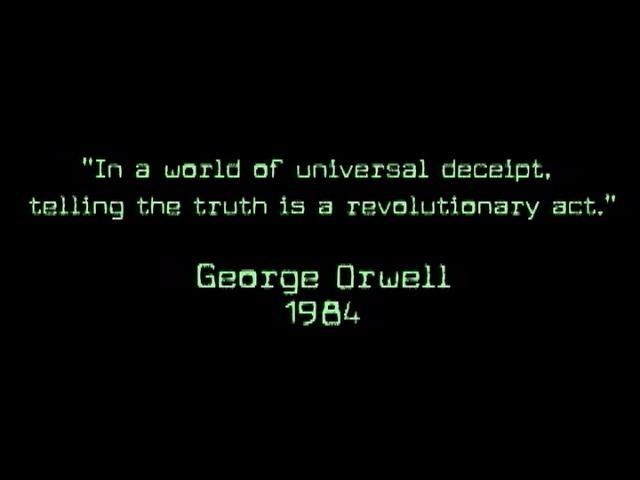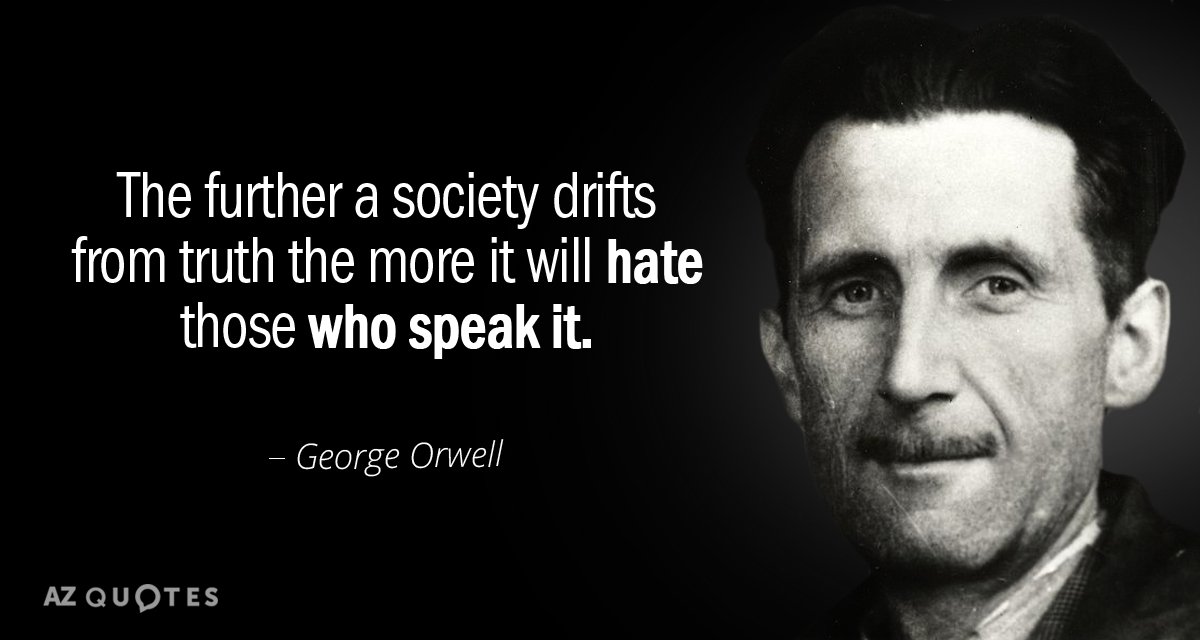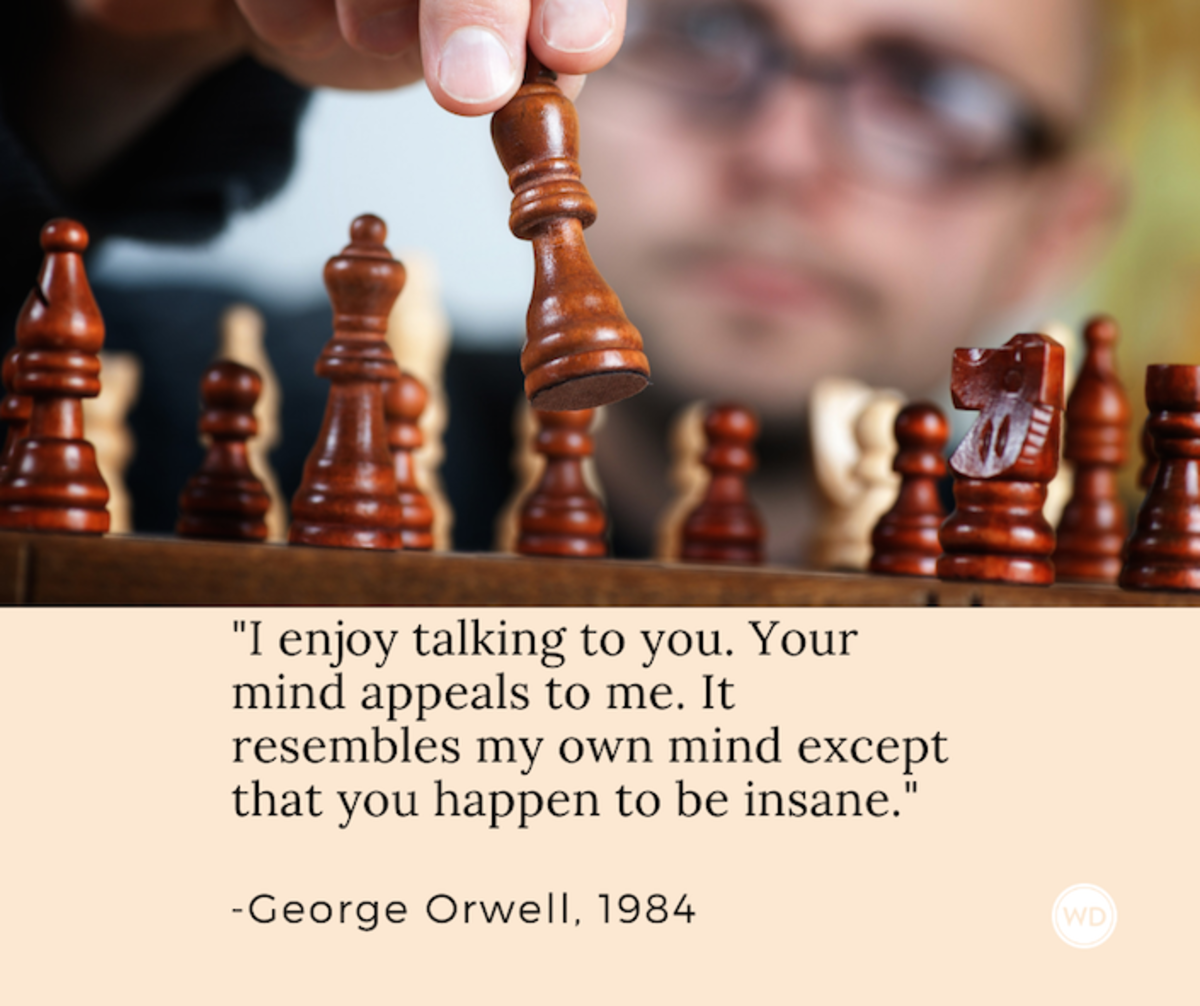Plenty of stories make ripples. The ripples they create inspire some, and makes others look deeply into themselves. Some stories can change the world – and frequently have! We would argue that one such book was 1984, the dystopian novel written by George Orwell in 1949. Now that 1984 (the year) has come and is long gone, we thought it might be interesting to take a look at this popular novel and see how its ripples continue to affect society today.

1984 was published on June 8th, 1949 – 73 years ago today. It would be English author George Orwell’s last work, as he was dying from tuberculosis while writing it, and passed away less than a year after its publication. Orwell himself was an atheist who supported democracy and vehemently opposed totalitarianism (of course). He was a proponent of simple pleasures, and was a fan of all traditional British delights – fish and chips, a strong cup of tea, a nice pub or chat by a fire, to name a few. It is no wonder how this kind of individual was able to write 1984, a book that played on a fear of oppressive government sanctions and a powerlessness to enjoy the simple pleasures in life.
For those that haven’t read it since their school days, 1984 follows the protagonist Winston Smith as he navigates his feelings towards an undemocratic governmental regime. Smith realizes he is doomed quite early on in the tale, as he buys a journal at a small antiques shop (on a black market of sorts), in order to write his “illegal” thoughts down in. Smith wonders often at the idea of the rebels, constantly interpreting the actions of those around him as either for or against the regime – he rarely views anything as a simple personal interaction. He begins an illicit romantic relationship with a woman named Julia after she hands him a secret note that says “I love you” (yes, after Winston is sure her interest in him is as a government spy). They are happy and in love, though Winston’s interest in rebelling against the regime is significantly stronger than Julia’s. As Winston grows more interested in breaking away, he becomes closer with Mr. Charrington, the owner of the shop that sold him the journal. Winston also believes his direct superior at work is a member of the rebellious “Brotherhood”. Winston and Julia are eventually brought before both of them and invited to join the Brotherhood, before it is revealed that both Charrington and O’Brien (his superior) are actually members of the government’s “Thought Police” task force and Winston and Julia are arrested. After being tortured, interrogated and brainwashed for months, a final act involving fear, rats and selling out each other finally break the couple, individually. They are released back into normal society in Oceania, loving “Big Brother” as newly minted members of the tyrannical and ruthless regime.
While considering the above as a highly abridged Cliff Notes version of 1984, we look toward the meaning behind the novel and how its ripples still affect us today. We are lucky to live in a non-extremist, democratic society. We are obsessed with our Constitutional rights – one of the most important being the right to free speech, as Winston unfortunately did not have. As an article in The Atlantic stated “It’s almost impossible to talk about propaganda, surveillance, authoritarian politics, or perversions of truth without dropping a reference to 1984.” And that is true. “Big Brother” is a household term, a terrifying nightmarish possibility of a government that is allowed to become too involved in the lives of its citizens. Once again, we are lucky that we do not live in such a society. As music critic Dorian Lynskey (author of The Ministry of Truth: The Biography of George Orwell’s 1984) writes “By definition, a country in which you are free to read Nineteen Eighty-Four is not the country described in Nineteen Eighty-Four“. But the year of Trump’s inauguration as President saw the rise of 1984 back to the best-seller list. Why? Because many Americans worried about the beginning of the decline of democracy in our country. After all, the rise of a totalitarian administration is certainly something to fear.

But occasionally, we’ve had cause to ask if the totalitarian we fear may, in fact, be something within ourselves. In today’s world, we already allow companies, rather than the government, to watch our every move. It makes life easier for us, and we’ve had no visibly apparent reason to believe it is otherwise affecting our lives. We police the things each other say online, constantly. To both positive and negative ends. A problem today’s America faces isn’t that we are being oppressed by an authoritarian regime, but that because of the newspeak that we follow or watch we are too divisive to be able to be on the same page about anything whatsoever. It seems the news (and therefore groups of people), fall at two very far ends of a spectrum – without the ability to work together to make changes any which way. Unfortunately causing us to be at a consistent stalemate, daily. Normally we don’t quote lengthy paragraphs from others, but I believe George Packer said it correctly in an article about 1984:
“We are living with a new kind of regime that didn’t exist in Orwell’s time. It combines hard nationalism—the diversion of frustration and cynicism into xenophobia and hatred—with soft distraction and confusion: a blend of Orwell and Huxley, cruelty and entertainment. The state of mind that the Party enforces through terror in 1984, where truth becomes so unstable that it ceases to exist, we now induce in ourselves… Today the problem is too much information from too many sources, with a resulting plague of fragmentation and division—not excessive authority but its disappearance, which leaves ordinary people to work out the facts for themselves, at the mercy of their own prejudices and delusions.” 1984 hasn’t become obsolete, on the contrary – it is more important than ever that we look to it as the cautionary tale it was meant as. Let us not follow anyone blindly – and perhaps we can stop screaming at each other long enough to help each other. To see the problems in our society and make changes necessary for the safety, health and happiness of us all.
And whatever you do, don’t ever trust the antiques shop owners selling books, journals and other trinkets… obviously it is the quiet ones you need to watch out for!


